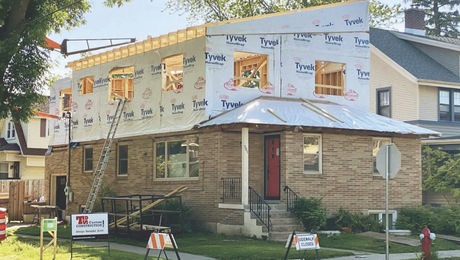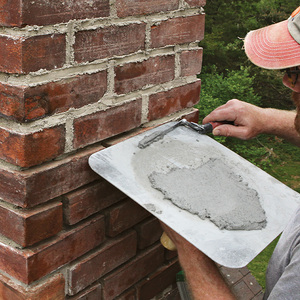Building Code/Permit Questions in MD
Hi All,
I need to finally get some rather involved work done on my house (for me, at least 🙂 ) and one of my many concerns is code compliance and the permitting process.
(A bit of background:
I have 1930’s Cape Cod style house in Baltimore, MD (in the city) and it’s not in the best shape. The previous owners started to build a rear addition that was really just a rearward extension of the rear rooms on the 1st and 2nd floors, along with a new rear room in the basement. The problem is that this work was never completed, so our 2nd floor bedroom has been drywalled, but never taped and painted (and has only a subfloor) and the back room on the first floor is worse: it has about half of its exterior wall area insulated and drywalled, with the rest left as open stud cavities with no insulation (but it does, at least, have the external sheathing and siding) — it’s a cold room! Anyway, my priority these days is to finish all air leak sealing in that first floor room and complete it’s insulation. Then I’d like to figure out exactly how we want that room divided up and build interior walls and finish the area. (It’ll probably become an office, 1/2 bath, and pantry.)
I have a good mechanical/technical/tool sense (used to be a pro car mechanic) and I’m the kind of guy that really tries to do all my own work. I realize much of working on my house will be new to me (coming from car repair), but I’m sure I can learn. I have a bunch of quality books on framing, drywalling, plumbing, electrical work, insulation, etc. (many from Taunton) and I’ve also learned a great deal by reading posts here.
)
So, I’m wondering about code compliance and permitting:
– Is it useful for someone in my position (a homeowner only doing work on his own home — no work for commercial gain) to get the various code books or does it make more sense to just glean the most important info from the books I already have (where general code references are often made)? I ask because Baltimore City uses many codes and these can get very expensive. Also, I’ve never read these codes — I wonder if they’re really useful to a single homeowner or if there’s a better way to learn the important information they contain. I’ll spend the money if it’s required to do good work, I’m just skeptical it is. Thoughts?
– I’m not sure I’ll get permits for everything I do on my house. I know the city says this is to “ensure safety and maintain property values”. Personally, I would not do work that wasn’t done well, so having to pay my city even more than I already do in property taxes just to be legal is hard for me to justify (I’ll be spending quite enough already to do the actual work). I may decide to do the permits, regardless, especially because then I won’t have to worry about the legal problems that might result. If anyone has any experience dealing with the Baltimore City permitting process (especially if you’re not a pro contractor, but even if you are), I’d be curious to know what you think. Are the fees reasonable? Can I learn any code that I need to know for the project by just talking to the inspector (and thereby skip buying the actual code books)?
Any help/thoughts/advice you all can provide is greatly appreciated!
Thanks!
Justin
(Here’s the listing of codes Baltimore uses:
BUILDING, FIRE, AND RELATED CODES
OF BALTIMORE CITY
INTRODUCTORY NOTE
This article comprises the following standards and codes, adopted by Ordinance
07-552, effective December 16, 2007:
Maryland Building Performance Standards / July 2007
International Building Code / 2006
National Electrical Code / 2005
National Fuel Gas Code / 2006
International Mechanical Code / 2006
National Standard Plumbing Code / 2006, 2007 Supp.
International Property Maintenance Code / 2006
International Fire Code / 2006
International Energy Conservation Code / 2006
International Residential Code, 1- and 2- Family Dwellings / 2006
)



















Replies
Justin,
I think you already know what the correct answer is. I would get the permits if you are doing something that requires one. If or when you decide to sell your house in the future, any work that was done unpermitted might come back to haunt you. I dont know how Baltimore City is, but when I built my detached garage, the county was very helpful in making sure eveything I was doing would be ok. You can pass a pretty easy, open book test to get a homeowners license for the electrical.
I bet the city has a web site that tells you what type of projects will require a permit.
Bill Koustenis
Advanced Automotive Machine
Waldorf Md
Bill,"...any work that was done unpermitted might come back to haunt you." Yeah, I do worry about that :)"You can pass a pretty easy, open book test to get a homeowners license for the electrical."
I am concerned that there may be certain work that I'll be completely blocked from doing -- I'm guessing gas plumbing is one. Do you know if there's a homeowner licensing program for gas fitting similar to the electrical one you mentioned?"I bet the city has a web site that tells you what type of projects will require a permit."
Yup, they do and they appear to require a permit for everything! From their site:A permit is required to:
• Construct, enlarge, alter, repair, rehabilitate, demolish
or move any structure
• Erect, install, enlarge, alter, repair, remove, convert,
or replace any electrical, gas, mechanical or plumbing
system
• Change the use of any structure or land
• Perform any grading or excavatingSo, that seems to cover everything I would do and I'm assuming many smaller stuff goes unpermitted, even though that's technically illegal. Ah, bureaucracy!Thanks,
Justin
Hey Justin- Welcome to Breaktime. I'm not a Pro, so you will get other advice from guys that do this everyday, but thought I'd share my experiences nonetheless. I live in Carroll County not far from you and this is my experience:
1) I recently built an addition and the codes are pretty specific for some things (like plumbing and electrical). I'm advanced as DIY goes so I know generally how things are supposed to be done. When I had a specific question, I either called a buddy in the trades I trust or BORROWED the book from the county offices. You can actually sign out the NEC code book from them for example. You're in Baltimore- check Enoch Pratt- I'm sure they have the books. Or the city may have reference copies you can use.
I also relied on the inspectors. Out here, they are generally helpful and looking to make a project move safely and smoothly. I took it as a complement when the framing inspector said "looks really good- who framed it for you?" and I could tell him it was my work.
2) For pretty much anything other than a basic afternoon repair, I pull permits. It keeps things clean, nobody can ever question the legitimacy of my work in the eyes of the county. Surprisingly enough, the permits here in the county are fairly inexpensive. YMMV in the city. Only you can make that decison for you.
For example, Carroll County requires that I purchase a permit for one of those Amish type storage sheds- even though it's on skids. If I were buying one of them, I wouldn't pull a permit- even though the county says I have too- in my mind it's nothing more than a revenue generator. If I decided to put electrical service in it once I got it? Then I would pull a permit since there is safety and an inspection involved.
I actually checked Pratt for the IRC 2006 book and they only had 1 reference copy of it in the entire city :) (They've got lots of the 2000 version in circulation.) At least it's available. Oh well, I may just buy a copy or use the older one to get most of it right and talk to the inspector to see what's different.Speaking of permit fees, I remember reading that the charge is a percentage of the total estimated materials and labor costs. Any idea how that works for DIYs with no actual labor costs? Do we have to pay a fee based on what we would pay a contractor to do the work for us?Thanks!
Justin
When I got my addition permits, the electrical and plumbing were base fees + charges for each fixture, outlet, etc. That said, I decided to add more electrical duplexes as I went and changed the lighting layout slightly in the garage. I never amended the permits and the inspector never mentioned it. As for the overall value, I just pulled a number out of my backside that was reasonable. I had talked to some people so had a good idea of what it would cost to frame the thing. And I knew what the materials should cost, so I had a good idea. The breakpoints were something like $50K apart, so the overall accuracy wasn't crucial. I came in about 10% over the number I guessed for frame and finish.
It really depends on your ambition to learn and save. I use the tauton as a good refference. You can usually pick the proffessionals brains apart for most of the codes and what to expect. IF not, you can find them on the internet. it good to know the codes but don't misenterprit them. easy to do.
carpenter of 12 years
Justin, I have a MHIC License from the State of Maryland up here in Cecil County. While I have not worked in the City for quite some time there are some things I'd like to suggest; First, pull the permits. While in the city permits are mainly revenue generators, you will have to disclsure, by law, any work done without a permit when you sell the place. Most inspectors in the City are decent folks but it is obvious that most are political appointees so don't expect much techical advice from them. Don't be afaird of pulling a permit.Your framing, electrical, plumbing, and insulation rough-in inspections have to be done before you install drywall so you will have a chance to correct any mistakes before anything gets covered up. As someone else suggested, find someone locally that has building trades knowledge to help guide you instead of relying on the City's inspectioin department. This Forum offers great advice as well as a wealth of information from other online sources. Good luck
I think after reading all the helpful responses to my questions, I've been convinced to get the permits for any new work I do. I'm still not sure how I'll approach finishing up the half-completed work, though. That expansion to the rear of my house appears to be at least 15 or 20 years old (the partially insulated, drywalled exterior walls). I'm worried that if I try to get a permit to finish up that work, the inspector might require me to actually rip out the already installed drywall/insulation, just so that an inspection can be done. Also, I'm assuming the framing could have been done to code specs 2 decades ago, but isn't up to snuff now. Could I be required to completely rip it out and start fresh? There's no way I could afford that now.With hindsight, I now see what a pain it can be to buy a house with only partially completed large changes. Maybe that's why we got such a good deal! :)Thanks!
Justin
Could I be required to completely rip it out and start fresh? There's no way I could afford that now.
Probably not, although I've had to replace bedroom windows during a major remodel to meet egress codes. Here's the thing about unfinished old work. Was it done correctly? You don't know how many times I've run across old DIY work that makes you wonder what they were thinking. While I can see why you don't want to make more work for yourself, why not tear off the old drywall and have a look-see?. Drywall is relatively cheap and you can check the quality of the old work and the insulation. You and the family are going to be living there. Make it safe and warm with the basics and maybe cut back on the fancy furniture until a later time. Good luck and don't be afraid of the inspectors. One last thing about the cost of the permits. You tell them the value of the work. In your case it is only materials so you base it on that amount. Good luck.
I worked a job months ago off Belair Rd that had permits. The neighbor was doing extensive remodeling and it cost him thousands for not having permits.... and he was mad at us for having a permit and calling in inspections.
Asking for forgiveness after the fact from Baltimore city is a waste of time and money.
You're not from these parts are you??? Everyone knows it's not Belair road. It's b'lair road-hon! Either that or the old Salvo Auto Parts commercials Beeeeeeeeeeeeeeeeeeeeeeeeeeeeelair.
Edited 1/5/2009 5:47 pm ET by frontiercc2
I actually live just north of Bel Air.
The name changes somewhere south of Perry Hall but I haven't figured out zacktly where.
One reason for getting permits is the disclosures you'll probably have to make when you sell the house someday. Here in CA, the seller must disclose any knowledge of unpermitted work done on the property.
That wasn't too big of a deal when the real estate market was booming and houses were sold "as-is", but these days it's biting several sellers in the arse.
Some cities have a pre-sale inspection. They look for work done without a permit, even something like a new water heater, and charge the seller for permit fees and penalties.John
They don't do those in CA, but my mother and MIL had to deal with that last year in MO when they sold their houses.Mom got by ok, but my MIL got hammered with a bunch of basement wall, plumbing and wiring problems.I don't know how it works in MD, but the OP probably should look pretty deeply into the ramifications of doing unpermitted work. Even if the work meets applicable codes, retroactive permit fees (and penalties) can add up fast.
I know Novato does it. Marin County. They want all the money they can find.John
Edited 1/5/2009 9:27 am ET by JohnCujie
"International Residential Code, 1- and 2- Family Dwellings / 2006"
If you decide to buy a copy of the code books that is what you want.
It includes all (or almost) every code that would going into a single family house. It has subsets of the NEC, plumbing, gas, etc codes, but limited to those part normally used in a home.
But also check the actual ordinance. Most like it is online. But cause the ordinance is really the code. It is not unusual for them to have something in there like #### code is adopted EXCEPT and then list parts that have been changed.
Typically only a handfull of items.
William the Geezer, the sequel to Billy the Kid - Shoe
Bill,Thanks for confirming what I was thinking -- that I should take a look at the IRC 2006 book. I guess it wasn't clear to me that it would include everything I needed. I'm not sure because Baltimore's code says it's adopted portions of these separate codes:Maryland Building Performance Standards / July 2007
International Building Code / 2006
National Electrical Code / 2005
National Fuel Gas Code / 2006
International Mechanical Code / 2006
National Standard Plumbing Code / 2006, 2007 Supp.
International Property Maintenance Code / 2006
International Fire Code / 2006
International Energy Conservation Code / 2006
International Residential Code, 1- and 2- Family Dwellings / 2006If I look in the Balto code under the IRC section, I see exactly what you're talking about -- references to the actual code, plus some Balto specific paragraphs.Example:
"2201.2.2 Outside above-ground tanks. {As in IRC}
Exception: If the 5-feet minimum distance from an adjoining property line cannot be met, the
Building Official will determine the location of the tank."But in other sections, instead of saying "As in IRC", it'll reference a diff. code.Example:
"CHAPTER 26
GENERAL PLUMBING REQUIREMENTS
{Not Adopted}
{See National Standard Plumbing Code as modified by BFR Article Part VI}"Bill, are you saying that the IRC actually includes even these portions that the Balto code says I have to find in the "National Standard Plumbing Code"? That's what I'm hoping, since the IRC appears to cover all major systems and codes I'd need to know. I'd rather not have to buy/find all of the codes I listed above if the one IRC is sufficient.Thanks!
Justin
Sorry, while the IRC includes a plumbing section, the city has disallowed it and is using a different code.I had not realized that they where not using the IPC. In fact I had never heard of the National Plumbing Code until now.Only the IPC and the UPC (Uniform).I have no idea of what the differences are. In fact the plumbing codes (venting) are very confusing to me. You might want to see if the Taunton CodeCheck series for plumbing includes the NPC and use it in conjunction with the IRC and plumbing book.And not bother looking at the NPC it'self. But again I don't know how different it is.Here is a downloadable copy of the 2000 IRC. It is a self expanding file, that is why it is a EXE file. And it generates a whole series of small PDF files. So you want it to end up in it's own sub-directory.http://support.broderbund.com/faq_list.asp?id=1294820050#downloadsHowever, that was the first of the IRC's and I believe that they have expanded a lot..
William the Geezer, the sequel to Billy the Kid - Shoe
Thanks for that link, Bill. It's very helpful, even if it is an older version. I'll probably pick up the 2006 IRC and the CodeCheck books soon to get the most recent info. Thanks again!-Justin
Many thanks to everyone that responded! You sure know how to make a newbie feel welcome :) (And I got a lot of good ideas in the process).Thanks All!
Justin
"You sure know how to make a newbie feel welcome "It is on the second question that we all get together and get out the pitch forks <G>..
William the Geezer, the sequel to Billy the Kid - Shoe
Justin, Did the old owners have permits? If not, do you have anything to say the work done so far is NOT yours, if not, best get something.Sometimes when you open a door with a good heart all you get is heart burn.That said still get the permits you need.
Good question. I don't know if the work was permitted and I wasn't thinking about this when we bought the house (whoops!) I believe I can find a copy of the pre-purchase home inspection that certainly noted the unfinished work. Also, I have a dated tax assessment appeal with pictures of everything showing that the house was already like this (I lost the appeal because they figured it was worth what we paid, regardless of the condition :) ).This aspect of our house and the work I need to do on it is what worries me most -- that the half-done work may not be up to code standards and that I may need to rip it out so that it can be either opened for inspection or, worse, brought up to code. (That's a lot more money and hassle than I really want to deal with now -- I really just want to better seal/insulate the house for this winter. The real finishing work will have to come a bit later.)Thanks!
Justin
Well Justin if it were me, I would just do that seal/insulate and no wiring or plumbing.What you want is to stay warm. In the mean time try to find out if the old work is up to code or not. This will tell you what size of bullet you are about to chew on.Most inspectors just want everyone safe, they also come from a point of view of the next new owners, not from you and your problems.That said there are good days and bad with everyone.
Back to the work, maybe do it with the idea of just getting to spring time. And a redo with permits and up dates later.
Good Luck
Re. the codes, Bill hartman nailed it.
IRC covers everything residential except for city specific stuff.
I'd go touch base with the city inspector for your area, find out about the old permits, see what you need to do to get up and running with new permits, and get the IRC book. (international residential code) I'd suggest coffee and red bull if you are going to read the code book.
What you want to do is read the applicable areas based on what you are doing.
Re. drywall-look up fastening schedule for interior finishes and that is what you need to know if you want to know it.
good luck
The local libraries have copies of all the building codes - so just read them at the library and take notes.
Definitely pull the permits - the cost and expense of non-compliance is huge, and will hit you sooner or later. There are insurance issues as well - the insurance company can void your insurance after a disaster if they can show you had ANY unpermitted work.